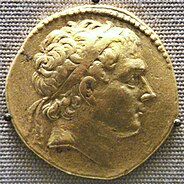Ptolemy IV Philopator
| Ptolemy IV Philopator | |||||||||||||||||||||||||||||||||||||||||||||||||||||||||||||||||||||||||||||||||||||||||||||||||||||||||||||||||||||||||||||||||||||||||||||||||||||||||||||||||||||||||||||||||||||||||||||||||||||||||||||||||||||||||
|---|---|---|---|---|---|---|---|---|---|---|---|---|---|---|---|---|---|---|---|---|---|---|---|---|---|---|---|---|---|---|---|---|---|---|---|---|---|---|---|---|---|---|---|---|---|---|---|---|---|---|---|---|---|---|---|---|---|---|---|---|---|---|---|---|---|---|---|---|---|---|---|---|---|---|---|---|---|---|---|---|---|---|---|---|---|---|---|---|---|---|---|---|---|---|---|---|---|---|---|---|---|---|---|---|---|---|---|---|---|---|---|---|---|---|---|---|---|---|---|---|---|---|---|---|---|---|---|---|---|---|---|---|---|---|---|---|---|---|---|---|---|---|---|---|---|---|---|---|---|---|---|---|---|---|---|---|---|---|---|---|---|---|---|---|---|---|---|---|---|---|---|---|---|---|---|---|---|---|---|---|---|---|---|---|---|---|---|---|---|---|---|---|---|---|---|---|---|---|---|---|---|---|---|---|---|---|---|---|---|---|---|---|---|---|---|---|---|
| Greek:Πτολεμαῖος Φιλοπάτωρ Ancient Egyptian:Iwaennetjerwymenkhwy Setepptah Userkare Sekhemankhamun[1] | |||||||||||||||||||||||||||||||||||||||||||||||||||||||||||||||||||||||||||||||||||||||||||||||||||||||||||||||||||||||||||||||||||||||||||||||||||||||||||||||||||||||||||||||||||||||||||||||||||||||||||||||||||||||||
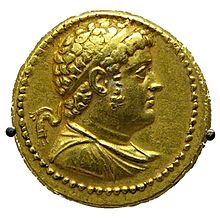 Goldoctadrachmin theBritish Museum | |||||||||||||||||||||||||||||||||||||||||||||||||||||||||||||||||||||||||||||||||||||||||||||||||||||||||||||||||||||||||||||||||||||||||||||||||||||||||||||||||||||||||||||||||||||||||||||||||||||||||||||||||||||||||
| Pharaoh | |||||||||||||||||||||||||||||||||||||||||||||||||||||||||||||||||||||||||||||||||||||||||||||||||||||||||||||||||||||||||||||||||||||||||||||||||||||||||||||||||||||||||||||||||||||||||||||||||||||||||||||||||||||||||
Kingof thePtolemaic Kingdom | |||||||||||||||||||||||||||||||||||||||||||||||||||||||||||||||||||||||||||||||||||||||||||||||||||||||||||||||||||||||||||||||||||||||||||||||||||||||||||||||||||||||||||||||||||||||||||||||||||||||||||||||||||||||||
| Reign | 221 – 204 BC | ||||||||||||||||||||||||||||||||||||||||||||||||||||||||||||||||||||||||||||||||||||||||||||||||||||||||||||||||||||||||||||||||||||||||||||||||||||||||||||||||||||||||||||||||||||||||||||||||||||||||||||||||||||||||
| Predecessor | Ptolemy III | ||||||||||||||||||||||||||||||||||||||||||||||||||||||||||||||||||||||||||||||||||||||||||||||||||||||||||||||||||||||||||||||||||||||||||||||||||||||||||||||||||||||||||||||||||||||||||||||||||||||||||||||||||||||||
| Successor | Ptolemy V | ||||||||||||||||||||||||||||||||||||||||||||||||||||||||||||||||||||||||||||||||||||||||||||||||||||||||||||||||||||||||||||||||||||||||||||||||||||||||||||||||||||||||||||||||||||||||||||||||||||||||||||||||||||||||
| |||||||||||||||||||||||||||||||||||||||||||||||||||||||||||||||||||||||||||||||||||||||||||||||||||||||||||||||||||||||||||||||||||||||||||||||||||||||||||||||||||||||||||||||||||||||||||||||||||||||||||||||||||||||||
| Consort | Arsinoe III,Agathoclea | ||||||||||||||||||||||||||||||||||||||||||||||||||||||||||||||||||||||||||||||||||||||||||||||||||||||||||||||||||||||||||||||||||||||||||||||||||||||||||||||||||||||||||||||||||||||||||||||||||||||||||||||||||||||||
| Children | Ptolemy V | ||||||||||||||||||||||||||||||||||||||||||||||||||||||||||||||||||||||||||||||||||||||||||||||||||||||||||||||||||||||||||||||||||||||||||||||||||||||||||||||||||||||||||||||||||||||||||||||||||||||||||||||||||||||||
| Father | Ptolemy III | ||||||||||||||||||||||||||||||||||||||||||||||||||||||||||||||||||||||||||||||||||||||||||||||||||||||||||||||||||||||||||||||||||||||||||||||||||||||||||||||||||||||||||||||||||||||||||||||||||||||||||||||||||||||||
| Mother | Berenice II | ||||||||||||||||||||||||||||||||||||||||||||||||||||||||||||||||||||||||||||||||||||||||||||||||||||||||||||||||||||||||||||||||||||||||||||||||||||||||||||||||||||||||||||||||||||||||||||||||||||||||||||||||||||||||
| Born | May or June 244 BC[2] | ||||||||||||||||||||||||||||||||||||||||||||||||||||||||||||||||||||||||||||||||||||||||||||||||||||||||||||||||||||||||||||||||||||||||||||||||||||||||||||||||||||||||||||||||||||||||||||||||||||||||||||||||||||||||
| Died | July or August 204 BC (aged 40)[2] | ||||||||||||||||||||||||||||||||||||||||||||||||||||||||||||||||||||||||||||||||||||||||||||||||||||||||||||||||||||||||||||||||||||||||||||||||||||||||||||||||||||||||||||||||||||||||||||||||||||||||||||||||||||||||
| Dynasty | Ptolemaic dynasty | ||||||||||||||||||||||||||||||||||||||||||||||||||||||||||||||||||||||||||||||||||||||||||||||||||||||||||||||||||||||||||||||||||||||||||||||||||||||||||||||||||||||||||||||||||||||||||||||||||||||||||||||||||||||||
Ptolemy IV Philopator[note 1](Greek:Πτολεμαῖος Φιλοπάτωρ,romanized:Ptolemaĩos Philopátōr;"Ptolemy, lover of his Father"; May/June 244 – July/August 204 BC) was the fourthpharaohofPtolemaic Egyptfrom 221 to 204 BC.
Ptolemy IV was the son ofPtolemy IIIandBerenice II.His succession to the throne was accompanied by a wide-ranging purge of thePtolemaic royal family,which left control of the realm's government largely in the hands of his courtiersSosibiusandAgathocles.His reign was marked by theFourth Syrian War(219–217 BC) with theSeleucid empire,which culminated in a decisive Ptolemaic victory at theBattle of Raphia,one of the largest battles of the wholeHellenistic Age.In the final years of his rule, control over the southern portion of the country was lost to the rebel pharaohHugronaphor.Ptolemy IV died in mysterious circumstances in 204 BC and was succeeded by his young sonPtolemy V Epiphanesunder the regency of Sosibius and Agathocles.
In ancient sources, Ptolemy IV was criticised for being more interested in luxury and court ceremony than government, politics, and foreign relations. The decline of the Ptolemaic dynasty is usually traced to his reign.
Background and early life[edit]
Ptolemy IV was the second child and eldest son ofPtolemy IIIand his wifeBerenice II.He was born about two years after his father's accession to the throne of Egypt. Ptolemy IV had an older sister,Arsinoe III,and three younger brothers, Lysimachus (name uncertain), Alexander andMagas,all born in the 240s BC. The whole family is commemorated by a statuary groups set up atThermosandDelphiby theAetolian League.[3][4]Under Ptolemy III, the Ptolemaic kingdom had reached its height, decisively defeating the rivalSeleucid kingdomin theThird Syrian War(246–241 BC), financing mainland Greek opposition toAntigonid Macedonia,and maintaining control of nearly the entire eastern Mediterranean seaboard. However the reign was also marked by the first native Egyptian revolt against Ptolemaic rule, in 245 BC. In the final years of Ptolemy III's reign, theCleomenean War(229–222 BC) broke out in Greece and, despite receiving substantial Ptolemaic support,Cleomenes IIIofSpartahad been completely defeated by an Antigonid-led coalition and forced to flee to Egypt.[5][6]
Reign[edit]
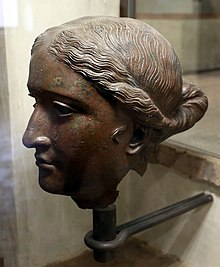
Sometime between October and December 222 BC, Ptolemy III died and Ptolemy IV was crowned king. The new king was about twenty years old and was under the strong influence of two prominent aristocrats:SosibiusandAgathocles,the brother of Ptolemy IV's mistressAgathoclea.On Ptolemy IV's accession, Sosibius engineered a large-scale purge of the royal family in order to eliminate anyone who might be able to oppose him. Ptolemy IV's uncleLysimachuswas probably murdered at this time.[7][8]His mother Berenice II was believed to support his younger brother Magas, who had held substantial military commands and was popular with the army, so Magas was scalded to death in his bath.[9][4]Berenice II died shortly afterwards; she is said to have been poisoned.[10][11]By contrast, Ptolemy IV's older sister,Arsinoe III,was brought into close association with the king. They had married by 220 BC;sibling marriagewas a common practice among Egyptian royal families, including the Ptolemies.[12]
Fourth Syrian War (219–217 BC)[edit]
In 222 BCAntiochus IIIhad assumed the Seleucid throne and he instantly proved a dynamic leader, determined to restore Seleucid power and to reverse the losses that the Seleucids had suffered in the Third Syrian War. In 221 BC, one year after his accession, Antiochus III invaded the Ptolemaic territories inCoele-Syria.He was rebuffed by the Ptolemaic governor of the region,Theodotus,and forced to turn east as a result of the revolt of his satrap ofMedia,Molon.[13][14]
In spring 219 BC, Antiochus III tried again, attacking and capturing the key port city and 'hearth of the Seleucid dynasty'Seleucia Pieria,which had been under Ptolemaic control since 246 BC. Immediately after this, Theodotus, who had become unpopular at the Ptolemaic court, switched to the Seleucid side, bringing Coele Syria and a large portion of the Ptolemaic fleet with him.[15]Antiochus III received the surrender ofTyreandPtolemais Ake,but he became bogged down in protracted sieges ofSidonandDora.[16][14]
In the midst of this, there was a revolt in Alexandria, led by Cleomenes III of Sparta, whichPolybiuspresents as having been a serious threat to Ptolemy IV's regime. Ptolemy III had promised to restore Cleomenes III, now living in Alexandria with a force of 3,000 mercenaries, to the Spartan throne, but his death had put an end to these plans. Initially, Ptolemy IV and Sosibius had indulged Cleomenes III, seeing him as a counter to Ptolemy IV's brother Magas. But after Magas' death, Ptolemy IV's interest waned and Sosibius had had the Spartan placed under house arrest. In 219 BC, while Ptolemy IV was atCanopus,Cleomenes III broke free and attempted to lead an armed uprising against Sosibius. He and his followers launched an attack on the main citadel in Alexandria, hoping to liberate the men imprisoned within, but this attack was unsuccessful and the people of Alexandria did not respond to their call to rise up. Cleomenes III and his followers then committed suicide.[17][18]
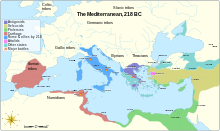
Antiochus III's efforts to consolidate his control over Coele Syria lasted for the rest of 219 BC. At the beginning of winter, he had to negotiate a ceasefire with Ptolemy IV. Formal peace negotiations followed at Seleucia Pieria, but they do not seem to have been undertaken in good faith on either side. Antiochus refused to consider returning Seleucia Pieria to the Ptolemies, while Ptolemy IV demanded that Antiochus III recogniseAchaeus,thede factoruler of Asia Minor, who was considered a rebel by the Seleucid court, as a party to the piece.[19][14]
Sosibius and Agathocles used the cease fire to whip the Ptolemaic army into shape, while Antiochus III used it to prepare for a new offensive. In early 218 BC, the Seleucid king obliterated the Ptolemaic forces atBerytuson land and at sea, opening the way for the invasion of Coele Syria. There he capturedPhiladelphia,but was unable to gain the southernBeqa'a valley,Damascus,orSidon.[20][14]
In 217 BC, Ptolemy IV and Arsinoe III led the Egyptian army into the Levant, where it met Antiochus III's army in battle atRaphiaon 22 June 217 BC. This was one of the largest battles of theHellenistic Agewith over 150,000 soldiers participating in the melee. At the start of the battle, the Ptolemaic elephant forces were routed and Antiochus followed that up by charging in on horseback and breaking the Ptolemaic left wing.Polybius(generally hostile to Ptolemy IV) represents Ptolemy IV's sudden appearance on the front lines as the decisive turning point in the battle, inspiring his troops to fight on and defeat the rest of the Seleucid army which turned and fled while Antiochus III was still chasing the fleeing Ptolemaic soldiers on the left wing. When he discovered what had happened, Antiochus III had no choice but to retreat to Antioch.[21][14]
After the battle, Ptolemy IV set to work reorganising the situation in Coele Syria and sent Sosibius to negotiate with Antiochus III. At the end of summer, he invaded Seleucid Syria, forcing Antiochus III to accept a peace treaty. Ptolemy IV retained the territories that he had held at the start of the war except, apparently, Seleucia Pieria, and he received an enormous sum of gold. By 12 October, Ptolemy IV had returned to Egypt, where the victory was celebrated by a priestly synod atMemphiswhich issued theRaphia decree.The relatively mild terms of the peace and Ptolemy IV's failure to capitalise on his victory by going on the offensive have caused some surprise among modern scholars; the Raphia decree refers rather unclearly to "the treachery which the commanders of the troops perpetrated" which may be relevant to Ptolemy's decision to make peace.[22][14]
Foreign affairs in the later reign (217–205 BC)[edit]
After the Fourth Syrian War, Antiochus III quickly recovered his strength and led successful expeditions against other enemies. Probably as a result, Ptolemy IV's interactions with other states all focused on maintaining peaceful relations and preventing warfare.
In mainland Greece, Ptolemy IV attempted to rebuild the Ptolemaic influence that had suffered a serious setback under Ptolemy III as a result of theCleomenean War.In 217 BC, Ptolemy's diplomats helped to broker the Peace of Naupactus which brought an end to theSocial WarbetweenAntigonid Macedoniaand theAetolian League.[23]He had much less success in his attempts to negotiate a peace between the Macedonia and theRoman Republicin theFirst Macedonian War(215–205 BC).[24]Ptolemy IV made large financial contributions to a number of Greek cities in order to gain their favour. He was responsible for the city walls atGortyninCrete[25]Ptolemy was honoured for his benefactions with monuments and cults in his honour at various cities, includingRhodesandOropus[26][27]
In the west, Ptolemy maintained friendly neutrality with the Roman Republic andCarthage,which were fighting against one another in theSecond Punic War(218-201 BC). He received a friendly embassy from the Romans in 210 BC, requesting a gift of grain to help feed the starving populace. It is unknown how Ptolemy responded to this request.[28]Like his predecessors, Ptolemy IV maintained particularly close relations with the kingdom of Syracuse under KingHiero II,but the accession of Hiero II's grandsonHieronymusin 215 BC threatened to upset the careful balance that Ptolemy IV had maintained. Hieronymus repeatedly tried to bring the Ptolemies into the Second Punic War on the Carthaginian side.[29]The situation was resolved with his assassination in 214 BC.[30]
Egyptian Revolt and death (206–204 BC)[edit]
Sometime after the end of the Fourth Syrian War, revolts broke out in Egypt itself. Fighting took place in the north of the country in theDeltaand separately inUpper Egypt,where fighting led to the interruption of building work on the Temple of Horus atEdfuin 207–206 BC.[31]The reasons for these revolts are unclear. The Hellenistic historianPolybiusargued that they were a natural result of Ptolemy IV's decision to arm the Egyptians during the Fourth Syrian War.[32]Günther Hölblargues that the fact that the rebels attacked Egyptian temples suggests that it was "a rebellion of the lower classes inspired by social injustice," that had been exacerbated by the heavy taxation necessary to fund that war.[33]In October or November 205 BC, the leader of the southern revolt captured the city ofThebesand had himself crownedPharaoh,taking the name Horwennefer, rendered in Greek sources asHugronaphor.Despite Ptolemaic efforts to suppress his regime, Horwennefer would retain his independence for nearly twenty years, until finally captured in August 186 BC.[34][35]
The revolt meant that Ptolemaic forces were unable to defend southern Egypt fromNubianincursions. Probably in 207–06 BC, KingArqamaniofMeroeseized control of theDodecaschoenus.A number of the temple building projects that had been undertaken in this region were completed by Arqameni or his successorAdikhalamani.In many cases, the work of Ptolemy IV was simply appropriated by erasing his name from inscriptions and replacing it with that of Arqameni.[36]
In the midst of this conflict, in July or August 204 BC, Ptolemy IV died in unclear circumstances. A late source,John of Antiochmentions a fire in the palace. Arsinoe III also died at this time. According toJustin,she had been divorced and murdered by Ptolemy IV under the influence of his mistress Agathoclea, shortly before his own death. According toPolybius,she was murdered by Sosibius. After a few days during which Ptolemy IV's death was kept secret, his six-year-old sonPtolemy V,who had been co-regent since 210 BC, was formally proclaimed king with Sosibius and Agathoclea's brother Agathocles as his regents.[37][2][30]
Regime[edit]
Ptolemaic dynastic cult[edit]
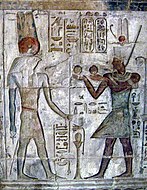
Like early Ptolemaic monarchs, Ptolemy IV was proclaimed to be a deity on his accession to the throne, as theTheos Philopator(Father-loving God). Particularly after theFourth Syrian War,he systematised the dynastic cult, reinforcing the links between the worship of the reigning king and the cults ofAlexander the GreatandDionysus.[36]
In 216–215 BC, after the victory celebrations for the Fourth Syrian War, Ptolemy IV and his wife as theTheoi Philopatores(Father-loving gods) were formally incorporated into the dynastic cult. This meant that they were added to the title of the Priest of Alexander the Great inAlexandria,who led the Ptolemaia festival and whose name and titulary was used to name the year in all official and private documents. This followed the pattern that had been laid down by Ptolemy IV's predecessors, particularly Ptolemy III, whose incorporation into the dynastic cult seems to have formed part of the victory celebrations for theThird Syrian War.[2]
In order to assert the unity of this dynastic cult, Ptolemy IV had the existingtomb of Alexander the Greatand the tombs of the individual Ptolemaic kings in Alexandria demolished. A new, pyramidal structure was built within the palace district of Alexandria to house the bodies of Alexander and the Ptolemies together. This structure seems to have been consecrated at the Ptolemaia festival of 215–214 BC.[38][36]At the same time, Ptolemy IV incorporated the cult of the dynastic foundersPtolemy IandBerenice Ias theTheoi Soteres(Saviour gods) into the main dynastic cult overseen by the priest of Alexandria. Probably also in 215–214 BC, he instituted a new cult in the Greek city ofPtolemaisin southern Egypt, dedicated to Ptolemy I and the reigning monarch.[36]
In 211 BC, Ptolemy IV seems to have begun propagating another cult for his deceased mother Berenice II, on the model of the earlier cult for Ptolemy IV's grandmother,Arsinoe II.A temple for Berenicesozousa(Berenice who saves) was established in Alexandria, by the shore, and seems to have been associated with protection of sailors, closely paralleling the cult of Arsinoe II. Berenice also received a special priestess, theathlophorus(prize-bearer), who marched in the Ptolemaia procession and appeared in official records of the date ahead of thecanephorus(basket-bearer) of Arsinoe II. Similar priestesses would be established for later queens in the following reigns.[36]

Ptolemy IV also strongly emphasised the cult ofDionysusand linked the god closely to the dynastic cult. Dionysus was the Greek god of wine and was closely associated with the royal ideal of opulence and luxury, known in Greek astryphe,which Ptolemy IV wished to cultivate. Several new festivals of Dionysus were inaugurated, in which Ptolemy IV himself led the processions, beating on atympanon.[39]He renamed several areas of Alexandria in honour of Dionysus and his attributes. Sometime before 217 BC, Ptolemy IV ordered all priests of Dionysus to come to Alexandria to be registered and to submit their holy books and mystery rites to government inspection. This demonstrates a desire to assert his total control of Dionysus worship within his realm. Ptolemy IV himself was referred to as theNeos Dionysos(New Dionysus) and depicted with attributes of the god in images.[36]Equations with other deities were also made in royal imagery: one notable set of gold octodrachmsdepicts the king with the rayed crown ofApolloorHelios,the trident ofPoseidon,and theaegisofAthena,Zeus,and Alexander.
Many Greek cities that were under Ptolemy IV's control or aligned with him also established official cults in his honour during his reign. Greek cities in this period regularly granted such cults to monarchs and other powerful individuals, usually in thanks for a specific benefaction. Notable examples are found inJaffaand other cities of the Levant after the victory at Raphia, where Ptolemy even bears the titleGreat king.[40][36]
Pharaonic ideology and Egyptian religion[edit]

Like his predecessors, Ptolemy IV presented himself as a typical Egyptian pharaoh and actively supported the Egyptian priestly elite through donations and temple construction. Ptolemy III had introduced an important innovation in 238 BC by holding a synod of all the priests of Egypt atCanopus.Ptolemy IV continued this tradition by holding his own synod atMemphisin 217 BC, after the victory celebrations of the Fourth Syrian War. The result of this synod was theRaphia Decree,issued on 15 November 217 BC and preserved in three copies. Like otherPtolemaic decrees,the decree was inscribed inhieroglyphs,Demotic,andKoine Greek.The decree records the military success of Ptolemy IV and Arsinoe III and their benefactions to the Egyptian priestly elite. Throughout, Ptolemy IV is presented as taking on the role ofHoruswho avenges his father by defeating the forces of disorder led by the godSet.In return, the priests undertook to erect a statue group in each of their temples, depicting the god of the temple presenting a sword of victory to Ptolemy IV and Arsinoe III. A five-day festival was inaugurated in honour of theTheoi Philopatoresand their victory. The decree thus seems to represent a successful marriage of Egyptian pharaonic ideology and religion with the Hellenistic Greek ideology of the victorious king and his ruler cult.[41]
Ptolemy IV also maintained a close and friendly relationship with the priestly elite by supporting and funding construction work at sanctuaries throughout Egypt, mostly continuing projects begun earlier in the dynasty. The most notable example of this is theTemple of HorusatEdfu,where construction had begun in 237 BC under Ptolemy III, but carried on through most of Ptolemy IV's reign until Hugronaphor's revolt forced the end of works in 207–206 BC. By that time most of the structure had been built and most of the interior decoration had been carved. These inscriptions present Ptolemy IV as an ideal pharaoh, emphasising his military victories in Syria and his pious attitude towards the gods. Annual coronation rituals took place in the sanctuary, in which the godHorussymbolically received kingship fromRaandOsirisand the reigning Pharaoh received his kingship from Ra and Horus. Ptolemy IV never participated in this ritual personally; his role was played by a priest. Support for the sanctuary thus represented the Ptolemaic commitment to a traditional Egyptian theology of kingship.[42]
Other construction work carried out under Ptolemy IV's auspices included (from north to south):
- A shrine ofHarpocratesin theSerapeum of Alexandria[36]
- Reconstruction of theNaosof the Temple ofMut,Khonsu,andAstarteatTanis[42][43]
- The east gate of the Temple of Ptah atMemphis[42]
- A new temple forHathoratCusae[42]
- A new temple ofNemtyatTjebu[44]
- Extensions to theTemple of Min and Isisat Koptos[45][46]
- Decorative work on the greatgatewayof thePrecinct of Montuand a chapel of Khonsu-Neferhotep atKarnak,Thebes[42]
- Shrine for Hathor andMaatatDeir el-Medina,west of Thebes[42]
- Decorative work on the temple of the Theban triad at theKharga Oasis[42]
- Completion of theTemple of MontuatMedamud[42]
- Decorative work and a sanctuary ofArensnuphisatPhilae[42]
- Completion of the temple of Isis onSehel Island,Aswan[42]
- Reconstruction of the temple ofThothatDakka[42]
Literature[edit]
Ptolemy IV was devoted to orgiastic forms of religion and literary dilettantism.[47]He built a temple toHomerin Alexandria[48]and financed festivals for theMuses,both in Alexandria and in the valley of the Muses inThespiaeinBoeotia.He also composed a tragedy onAdonis,on which his courtier Agathocles wrote a commentary.[49]
Luxury[edit]

Ptolemy IV is said to have built a giant ship known as thetessarakonteres( "forty-rowed" ), a hugegalleyand possibly the largest human-powered vessel ever built. This showpiece galley was described byCallixenus of Rhodes,writing in the 3rd century BC, and quoted byAthenaeusin the 2nd century AD.[50]Plutarch also mentions that Ptolemy Philopator owned this immense vessel in hisLife of Demetrios.[51]According to these sources, the ship was 128 m long and required 4,000 oarsmen. The appearance and structure of this ship have been much discussed in modern scholarship.Lionel Cassonproposes that it was a catamaran. It is generally agreed that the tessarakonteres served as a pleasure boat, not a military vessel.[52][30]
Legacy and reception[edit]
The main surviving account of Ptolemy IV's life and character is provided by the historianPolybius.He presents Ptolemy IV as the archetypal bad king, entirely focused on luxury and court ceremony and completely neglecting of politics, foreign affairs, and military pursuits, which he left entirely to Sosibius. According to Polybius, this neglect was the cause of the disasters of his reign, including his death.[53]Polybius was not a contemporary of Ptolemy IV; he probably drew his account from two earlier works which are now lost: theHistoriesofPhylarchusandThe Stories about PhilopatorbyPtolemy of Megalopolis.Both of these also seem to have criticised Ptolemy IV for his luxuriousness. However, for contemporaries, luxury (tryphe) was often presented as a virtue, which demonstrated a king's ability and willingness to make benefactions. It is possible that the surviving source tradition has taken efforts to advertise this virtue and twisted them into a negative account.[30]
Ptolemy IV is a major character in thedeuterocanonicalbiblical book3 Maccabees,which was probably written in the first century AD. In this work, set after the Battle of Raphia, the king is presented as an oppressive tyrant who transgresses divine law by trying to enter thetemple at Jerusalemand then launches an attempt to wipe out the Jews by gathering them all in the hippodrome at Alexandria and having them trampled by drunken elephants. These plans are repeatedly thwarted by the divine intervention ofYahweh.In the end, Ptolemy IV recants and grants extensive privileges to the Jews. It is not clear that this work indicates the existence of a negative Jewish tradition about Ptolemy. It may simply be using him to make a general moral point about the relative strength of secular and divine authorities. Some scholars argue that Ptolemy's character in this work was actually based on the Roman emperorCaligulaand his violations of Jewish sensibilities.[54]
Marriage and issue[edit]
Ptolemy IV married his sister Arsinoe III. Their only son, Ptolemy V, was born in 210 BC. Ptolemy IV may also have had a short-lived illegitimate son by his mistress Agathoclea in late c. 210 BC. However, it has been suggested that this child may actually have been Ptolemy V, on the basis of a passage written by the geographerStrabo.[55][2]
Notes[edit]
- ^Numbering the Ptolemies is a modern convention. Older sources may give a number one higher or lower. The most reliable way of determining which Ptolemy is being referred to in any given case is by epithet (e.g. "Philopator" ).
References[edit]
- ^Clayton (2006)p. 208.
- ^abcdeBennett, Chris."Ptolemy IV".Egyptian Royal Genealogy.Retrieved29 October2019.
- ^IGIX.1² 1:56;R. Flacelière,Fouilles de DelphesIII:4:2 no 233, pp 275ff
- ^abBennett, Chris."Magas".Egyptian Royal Genealogy.Retrieved30 October2019.
- ^PlutarchLife of CLeomenes32
- ^Hölbl 2001,pp. 43–54
- ^Polybius15.25.2
- ^Bennett, Chris."Lysimachus".Egyptian Royal Genealogy.Retrieved30 October2019.
- ^Polybius15.25.2;Plutarch,Life of Cleomenes33; Pseudo-PlutarchProverb. Alexandr.13
- ^Polybius,15.25.2. Cf.Zenobius,5.94.
- ^Hölbl 2001,pp. 127–128
- ^Bennett, Chris."Arsinoe III".Egyptian Royal Genealogy.Retrieved30 October2019.
- ^Polybius5.45–46
- ^abcdefHölbl 2001,pp. 128–132
- ^Polybius 5.40.
- ^Polybius 5.61–63, 66
- ^Polybius5.38–39;PlutarchLife of Cleomenes33–37
- ^Hölbl 2001,p. 128
- ^Polybius5.67
- ^Polybius5.68–71
- ^Polybius5.79–87;Justin,Epitome of Pompeius Trogus30.1
- ^Raphia Decree(link to text);Polybius5.87
- ^Polybius5.100.
- ^Polybius11.4.1;Livy,Ab Urbe Condita27.30 & 28.7.
- ^Strabo,Geography10.4.11
- ^IGXII.1 37; IG VII 298.
- ^Hölbl 2001,p. 132
- ^Polybius9.11a;LivyAb Urbe Condita27.4.10
- ^Polybius7.2.2;LivyAb Urbe Condita24.26.
- ^abcdHölbl 2001,p. 133
- ^Edfu IV.8.1–7, VII.7.5–7.
- ^Polybius5.107.1–3
- ^Hölbl 2001,pp. 153–154
- ^Hölbl 2001,pp. 154–155
- ^Bennett, Chris."Horwennefer / Ankhwennefer".Egyptian Royal Genealogy.Retrieved29 October2019.
- ^abcdefghHölbl 2001,pp. 161–162
- ^Polybius15.25–26a;Justin,Epitome of Pompeius Trogus30.2; John of AntiochFGrH558 F54
- ^StraboGeography17.1.8;Zenobius3.94
- ^EratosthenesFGrH241 F16
- ^Pfeiffer, Stefan (2015).Griechische und lateinische Inschriften zum Ptolemäerreich und zur römischen Provinz Aegyptus.Einführungen und Quellentexte zur Ägyptologie (in German). Vol. 9. Münster: Lit. pp. 102–104.
- ^Hölbl 2001,pp. 162–164
- ^abcdefghijkHölbl 2001,pp. 160–161
- ^Wilkinson, Richard H. (2000).The Complete Temples of Ancient Egypt.London: Thames & Hudson. p.113.ISBN9780500283967.
- ^Wilkinson, Richard H. (2000).The Complete Temples of Ancient Egypt.London: Thames & Hudson. p.142.ISBN9780500283967.
- ^Hölbl 2001,pp. 86–87
- ^Wilkinson, Richard H. (2000).The Complete Temples of Ancient Egypt.London: Thames & Hudson. p.151–152.ISBN9780500283967.
- ^Bevan, Edwyn(1927).The House of Ptolemy: a History of Egypt under the Ptolemaic Dynasty.London: Methuen. p. 233.
- ^AelianVariae Historiae13.22
- ^ScholiatoAristophanesThesmophoriazusae1059
- ^CallixenusFGrH627 F1 – AthenaeusDeipnosophistaeV 37.
- ^Demetrius43.4–5.
- ^Lionel Casson(1995).Ships and Seamanship in the Ancient World.Johns Hopkins University Press. pp. 108–109.ISBN0801851300.
- ^Polybius 5.34 & 14.12
- ^Clayton Croy, N. (2006).3 Maccabees: Septuagint Commentary Series.Leiden: Brill. pp. xii–xiii.
- ^StraboGeography17.1.11.
Bibliography[edit]
- Clayton, Peter A. (2006).Chronicles of the Pharaohs: the reign-by-reign record of the rulers and dynasties of ancient Egypt.Thames & Hudson.ISBN0-500-28628-0.
- Hölbl, Günther (2001).A History of the Ptolemaic Empire.London & New York: Routledge. pp. 143–152 & 181–194.ISBN0415201454.
- Chisholm, Hugh,ed. (1911)..Encyclopædia Britannica.Vol. 22 (11th ed.). Cambridge University Press. p. 617.
External links[edit]
- Ptolemy Philopator I at LacusCurtius– (Chapter VII of E. R. Bevan'sHouse of Ptolemy,1923)
- Ptolemy IV– (Egyptian Royal Genealogy)
- Ptolemaic Genealogy: Possible child of Ptolemy IV
- The great revolt of the Egyptians: 205–186 BC(2004)
- Ptolemy IV Philopatorentry in historical sourcebook by Mahlon H. Smith



